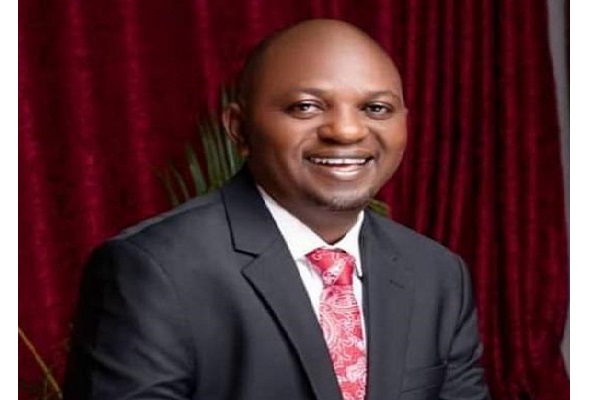Prof. Joseph Terlumun Utsev is no stranger to senior government cabinet assignments. His appointment by President Bola Ahmed Tinubu as the Minister of Water Resources and Sanitation was his second cabinet appointment after he had served in a similar capacity in Benue state as Commissioner of Water Resources and Environment.
That marks out Prof. Utsev, 44, a civil and water engineer, academic, politician, philanthropist, entrepreneur, and administrator, as one of the young Nigerian professionals with extensive cognate experience that have been saddled with the responsibility of executing President Tinubu’s Renewed Hope Agenda.


The core mandate of Prof. Utsev’s ministry is to develop a framework towards making the Water sector a pillar for food security, job creation, water supply, sanitation and hydropower as well as mitigate water-induced disasters like erosion and flooding in line with the President’s ‘Renewed Hope’ mantra. As expected, the minister felt at home in his new assignment. When he was the Benue state Commissioner of Water Resources and Environment, Prof. Utsev had contributed effectively towards tackling the hitherto perenial water scarcity in Makurdi, the state capital, and other communities in the state. His involvement in the design and influence on the construction of the Idye Basin Phase II drainage also showcased his commitment to improving the state’s erosion control infrastructure. Now, as the minister of Water resources, he has been drawing from that experience in discharging his responsibilities in the provision of water for consumption and irrigation agriculture, environmental sanitation as well as flooding and erosion control across the country.
On assumption of office, the minister swung into action by addressing the challenge of underutilization of millions of irrigable hectares of land across the country. In a meeting with stakeholders shortly after assuming office, Prof. Utsev underscored the significance of irrigation farming in Nigeria’s agriculture development and its contribution to the nation’s food security and economic development. He, along with the Minister of State for Water Resources and Sanitation, Hon. Bello Goronyo, separately undertook a comprehensive tour of all irrigation projects under the 12 River Basin Development Authorities (RBDAs) across the country. Consequently, Prof. Utsev delineated about 500,000 irrigable hectares of land to engage in rapid dry season farming to meet up with and mitigate the rising cost of living and attain food sufficiency.
He also initiated three new programmes designed to revolutionise Nigeria’s irrigated agricultural landscape, boost food security, create jobs and enhance economic growth. The new initiatives include Water for Expanded Irrigated Agriculture Programme (WEIRPRO), Partnership for Expanded Irrigation Programme (PEIRPRO), and River Basin Strategy for Poverty Alleviation (RB-SPA).
He promised to introduce fresh perspectives through infusion of innovative measures into some of the flagship projects and programmes of the RBDAs. He explained that the initiatives were geared towards cultivating more irrigable lands, aggressively combating hunger, alleviating poverty and propelling economic growth.
He said the ministry was strategically committed to innovative Water Resources Management aimed at promoting Integrated Water Resources Management and environmental sustainability, cultivate partnerships with State Governments and communities to enhance agricultural productivity, transitioning from traditional methods to a more scientific approach that guarantees all-year-round farming, more frequent cropping cycles and higher crop yields.
He underscored the need for the adoption of advanced farming techniques to alleviate the workload on farmers and highlighted the importance of community engagement to optimise land use.
He stressed the significance of training and capacity building, underlining the necessity for a robust tracking system for monitoring and evaluation.
Utsev further stated that the principles of accountability, performance with tangible outcomes, rewards and consequence management. He, therefore, directed the 12 River Basin Development Authorities, the Department of River Basin Operations and Inspectorate and the Departments of Dams and Irrigation to formulate a comprehensive framework and strategies for implementing the three new programmes.

On erosion control, Prof. Utsev has inaugurated the National Economic Council Adhoc Committee on Flood Mitigation, Adaptation, Preparedness, and Response. The Committee is charged with the responsibility to develop a roadmap to enhance Nigeria’s capabilities in flood mitigation, preparedness, adaptation, and response, informed by periodic updates from the Nigeria Hydrological Services Agency (NIHSA) and relevant MDAs in the disaster risk reduction sector.
This was followed in April 2024 by the unveiling of the Annual Flood Outlook (AFO) by the minister. The report indicated that 148 Local Government Areas (LGAs) in 31 States of the Federation were at risk of high flood, while 249 LGAs in 35 states and the Federal Capital Territory (FCT) were within moderate flood risk areas.
The report also highlighted that high flood risk were to be expected in the areas across three distinct seasons: April, May and June (AMJ); July, August, and September (JAS); and October and November (ON). The minister emphasized the need for the alignment of the AFO with the Presidential Agenda on Food Security, aimed at enhancing agriculture resilience among vulnerable communities by reducing exposure to climate-related disasters and leveraging the positive effects of flooding for sustainable growth and economic development.
In the area of water and sanitation, Prof. Utsev has unveiled the Water Sanitation and Hygiene Committees (WASHCOMs) report which aims to guide the implementation of WASH services at the local community level.
During the launch in Abuja, the minister emphasized the role of WASHCOMs in overseeing service delivery, promoting behaviour change, and ensuring the sustainability of WASH facilities. He highlighted the need for a framework for WASHCOM formation, training, and management to prevent breakdowns and promote sustainability in Nigeria, aligning with SDG targets 6.1 & 6.2.
He explained that WASHCOMs are institutionalized at the community level to enhance community management and accountability.
The launch signified a milestone in sustaining water supply, sanitation, and hygiene services nationwide, with a focus on expanding access and quality services at the community level across all Local Government Areas.
Prof. Utsev has also stated his commitment to giving priority to underserved communities in its WASH programmes. Speaking during the launch of WASH for Health and celebration of the 25th anniversary of Self-Help Africa, recently, the minister said that in collaboration with dedicated organisations and community champions, his ministry had made significant strides towards achieving the Federal Government’s Open Defecation Free (ODF) targets and improving overall sanitation standards.
“The FCDO-supported WASH for Health (WS4H) Programme when brought on board will act as a crucial catalyst in this journey, enabling us to strengthen our WASH systems, enhance community engagement, and empower local stakeholders to be the driving force behind sustainable change,” he stated.
Utsev, who maintained that the unveiling of the programme would help the government to look well into the future, reiterated the ministry‘s steadfast commitment to building upon the successes already achieved.
“In the years ahead, we will continue to prioritise the expansion of equitable and irrepressible WASH services, with a particular focus on underserved communities.
He said his ministry would work tirelessly to ensure that every household, school, and health facility in the country has access to safe, reliable, and sustainable WASH infrastructure.
He said that together, with the support of government’s “international partners and the unwavering determination of our people, we will write the next chapter of our WASH success story, paving the way for a healthier, more prosperous future for all.”
Engr. Prof. Joseph who hails from Benue State obtained a Bachelor of Engineering Degree in Civil Engineering from the Federal University of Agriculture (now JOSTUM), Makurdi, graduating as the best student in 2004 with a SecondClass Honours (Upper Division). His passion for knowledge led him to pursue higher education, earning both a Masters and PhD in Water Resources and Environmental Engineering from the prestigious University of Nigeria, Nsukka, in 2007 and 2011, respectively.
He served as the Deputy Director and later as a full Director in the Centre for Entrepreneurship Development at the Federal University of Agriculture, Makurdi, (now Joseph Sarwuan Tarka University, JOSTUM) from 2013 to 2017. Prof. Utsev served as the Commissioner for Water Resources and Environment under Governor Samuel Ortom and was awarded the Best Honourable Commissioner in the Water/Environmental sector in Nigeria by Independent Assessors in 2018.
In 2020, former President Muhammadu Buhari appointed him as the Executive Director of Engineering at the Lower Benue River Basin Development Authority (LBRBDA), Makurdi.
Until his appointment as minister of Water Resources, Prof. Utsev was the pioneer Rector of the Federal Polytechnic, Wannune, Benue State.
He is a Registered Civil Engineer certified by the Council for the Regulation of Engineering in Nigeria (COREN) and a Fellow of the Nigerian Society of Engineers and the Nigerian Institution of Civil Engineers, among others.






